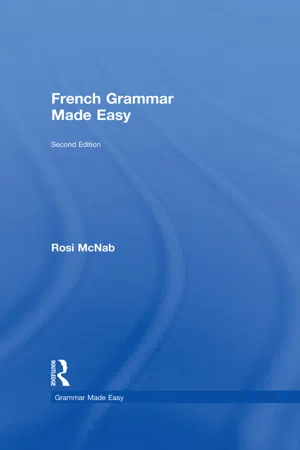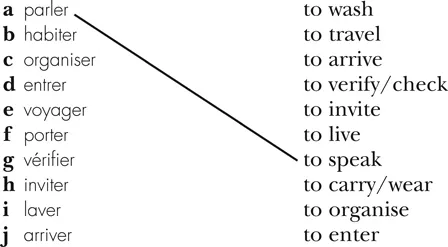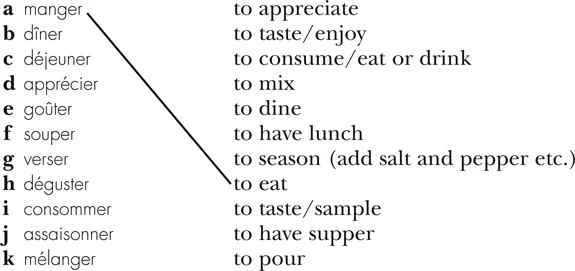
- 204 pages
- French
- ePUB (adaptée aux mobiles)
- Disponible sur iOS et Android
eBook - ePub
French Grammar Made Easy
À propos de ce livre
French Grammar Made Easy is the ideal introduction to the basics of French grammar for anyone new to the language or looking to refresh their knowledge.
The Grammar features:
- concise and jargon-free explanations supported by examples
- exercises throughout to reinforce learning
- a "fast-track" option for more advanced learners
- a full answer key, making the Grammar ideal for self-study.
French Grammar Made Easy presents the essential patterns and rules of the French language in a clear and accessible manner. It is the ideal Grammar for those wishing to supplement their learning and move beyond the phrasebook level.
Tools to learn more effectively

Saving Books

Keyword Search

Annotating Text

Listen to it instead
Informations
1
VERBS
1.1 Talking about doing things
Why verbs first? Because verbs are so important. They are the ‘glue’ that holds a language together. A noun is just the name of something or someone, it can be singular or plural, but a verb is used to tell [or ask] you something. In many languages verbs are ‘codified’ to tell you who or what is doing it or when it happens. In English we usually stick a lot of verbs together: He was running, I would like, Did you know? … but in French they usually add a different ending to the verb. Il courait, je voudrais, vous saviez?
►► If you know what a verb is, go on to 1.1.1.
You use a verb to talk about what someone or something does, is doing, has done or intends to do. A verb is often called a doing word.
To find out if a word is a verb, ask yourself if it is about doing something.
I Which of these words are things you can do?
- run
- jeans
- sleep
- make
- easy
- eat
- under
- blue
- think
- after
Some words can be used as verbs, nouns or adjectives, e.g. play can be a play at the theatre or part of the verb to play.
Ask: Are they ‘doing’ it? If they are, it is a verb.
II Which of the highlighted words are being used as verbs?
- Jason and Lily run a homework club in the church hall.
- They go for a run every morning.
- They both work at the local school.
- After work they go straight to the hall.
- Tonight they are having a meeting to discuss funding.
- They are meeting in the church hall.
- They need more chairs for the children.
- Jason usually chairs the meetings.
- Lily records the proceedings and types them up.
- The records show that they have met three times this year.
1.1.1 What is the infinitive?
►► If you know what the infinitive is, go on to 1.1.2.
When you look up a verb in a dictionary, you will find the infinitive. This is the ‘name’ of the verb.
In English, the infinitive consists of to + verb, e.g. to read, to buy, to travel.
III Here are some French infinitives. You probably know some of them already or can guess what they mean. See how many you can match up with their English counterparts.
Try to look for similarities between the French and the English. Some are obvious: for example, organiser means to organise. Others are less obvious, such as laver meaning to wash (a lavatory was the place where people used to wash) and porter meaning to carry (a porter was someone who carried something).

IV The verbs in III are usually referred to as ‘-er’ verbs (pronounced E.R.) because they end in -er. Here are some more -er verbs. How many of them do you know already? They all have to do with food and eating.

If you find it difficult to learn new words, try to find a ‘hook’ to hang them on: e.g. manger, a manger where you put the food for an animal. And if you have travelled in France, you will almost certainly have seen signs at places selling wine, saying Dégustation, which means they are inviting you to sample their wines.
More than 50% of English words derive from French words or have the same stem. If you don’t know a verb, try saying the English word with a French accent – you have a 50% chance of being understood!
New words made into verbs are usually -er verbs: e.g. faxer = to fax; surfer = to surf; monopoliser = to monopolise, etc.
V What do you think the French for these verbs would be? Cover up the French and see if you can work it out.
| a to decide... |
Table des matières
- Cover
- Half Title
- Series Page
- Title Page
- Copyright Page
- Contents
- Introduction
- 1 Verbs
- 2 Nouns and Determiners
- 3 Pronouns
- 4 Adjectives
- 5 Adverbs
- 6 Prepositions
- 7 Conjunctions and other useful words
- Verb tables
- Answers
Foire aux questions
Oui, vous pouvez résilier à tout moment à partir de l'onglet Abonnement dans les paramètres de votre compte sur le site Web de Perlego. Votre abonnement restera actif jusqu'à la fin de votre période de facturation actuelle. Découvrir comment résilier votre abonnement
Non, les livres ne peuvent pas être téléchargés sous forme de fichiers externes, tels que des PDF, pour être utilisés en dehors de Perlego. Cependant, vous pouvez télécharger des livres dans l'application Perlego pour les lire hors ligne sur votre téléphone portable ou votre tablette. Apprendre à télécharger des livres hors ligne
Perlego propose deux abonnements : Essentiel et Complet
- Essentiel est idéal pour les étudiants et les professionnels qui aiment explorer un large éventail de sujets. Accédez à la bibliothèque Essentiel comprenant plus de 800 000 titres de référence et best-sellers dans les domaines du commerce, du développement personnel et des sciences humaines. Il comprend un temps de lecture illimité et la voix standard de la fonction Écouter.
- Complet est parfait pour les étudiants avancés et les chercheurs qui ont besoin d'un accès complet et illimité. Accédez à plus de 1,4 million de livres sur des centaines de sujets, y compris des titres académiques et spécialisés. L'abonnement Complet comprend également des fonctionnalités avancées telles que la fonction Écouter Premium et l'Assistant de recherche.
Nous sommes un service d'abonnement à des ouvrages universitaires en ligne, où vous pouvez accéder à toute une bibliothèque pour un prix inférieur à celui d'un seul livre par mois. Avec plus d'un million de livres sur plus de 990 sujets, nous avons ce qu'il vous faut ! En savoir plus sur notre mission
Recherchez le symbole Écouter sur votre prochain livre pour voir si vous pouvez l'écouter. L'outil Écouter lit le texte à haute voix pour vous, en surlignant le passage qui est en cours de lecture. Vous pouvez le mettre sur pause, l'accélérer ou le ralentir. En savoir plus sur la fonctionnalité Écouter
Oui ! Vous pouvez utiliser l'application Perlego sur les appareils iOS et Android pour lire à tout moment, n'importe où, même hors ligne. Parfait pour les trajets quotidiens ou lorsque vous êtes en déplacement.
Veuillez noter que nous ne pouvons pas prendre en charge les appareils fonctionnant sur iOS 13 et Android 7 ou versions antérieures. En savoir plus sur l'utilisation de l'application
Veuillez noter que nous ne pouvons pas prendre en charge les appareils fonctionnant sur iOS 13 et Android 7 ou versions antérieures. En savoir plus sur l'utilisation de l'application
Oui, vous pouvez accéder à French Grammar Made Easy par Rosi McNab en format PDF et/ou ePUB ainsi qu'à d'autres livres populaires dans Langues et linguistique et Langue française. Nous disposons de plus d'un million d'ouvrages à découvrir dans notre catalogue.